第15章 CHAPTER I TWO CHILDHOODS(13)
When my dream, the dream into which this first contemplation of my idol plunged me, came to an end and I heard her speaking of Monsieur de Mortsauf, the thought came that a woman must belong to her husband, and a raging curiosity possessed me to see the owner of this treasure.
Two emotions filled my mind, hatred and fear,--hatred which allowed of no obstacles and measured all without shrinking, and a vague, but real fear of the struggle, of its issue, and above all of HER.
"Here is Monsieur de Mortsauf," she said.
I sprang to my feet like a startled horse. Though the movement was seen by Monsieur de Chessel and the countess, neither made any observation, for a diversion was effected at this moment by the entrance of a little girl, whom I took to be about six years old, who came in exclaiming, "Here's papa!""Madeleine?" said her mother, gently.
The child at once held out her hand to Monsieur de Chessel, and looked attentively at me after making a little bow with an air of astonishment.
"Are you more satisfied about her health?" asked Monsieur de Chessel.
"She is better," replied the countess, caressing the little head which was already nestling in her lap.
The next question of Monsieur de Chessel let me know that Madeleine was nine years old; I showed great surprise, and immediately the clouds gathered on the mother's brow. My companion threw me a significant look,--one of those which form the education of men of the world. I had stumbled no doubt upon some maternal wound the covering of which should have been respected. The sickly child, whose eyes were pallid and whose skin was white as a porcelain vase with a light within it, would probably not have lived in the atmosphere of a city.
Country air and her mother's brooding care had kept the life in that frail body, delicate as a hot-house plant growing in a harsh and foreign climate. Though in nothing did she remind me of her mother, Madeleine seemed to have her soul, and that soul held her up. Her hair was scanty and black, her eyes and cheeks hollow, her arms thin, her chest narrow, showing a battle between life and death, a duel without truce in which the mother had so far been victorious. The child willed to live,--perhaps to spare her mother, for at times, when not observed, she fell into the attitude of a weeping-willow. You might have thought her a little gypsy dying of hunger, begging her way, exhausted but always brave and dressed up to play her part.
"Where have you left Jacques?" asked the countess, kissing the white line which parted the child's hair into two bands that looked like a crow's wings.
"He is coming with papa."
Just then the count entered, holding his son by the hand. Jacques, the image of his sister, showed the same signs of weakness. Seeing these sickly children beside a mother so magnificently healthy it was impossible not to guess at the causes of the grief which clouded her brow and kept her silent on a subject she could take to God only. As he bowed, Monsieur de Mortsauf gave me a glance that was less observing than awkwardly uneasy,--the glance of a man whose distrust grows out of his inability to analyze. After explaining the circumstances of our visit, and naming me to him, the countess gave him her place and left the room. The children, whose eyes were on those of their mother as if they drew the light of theirs from hers, tried to follow her; but she said, with a finger on her lips, "Stay dears!" and they obeyed, but their eyes filled. Ah! to hear that one word "dears" what tasks they would have undertaken!
Like the children, I felt less warm when she had left us. My name seemed to change the count's feeling toward me. Cold and supercilious in his first glance, he became at once, if not affectionate, at least politely attentive, showing me every consideration and seeming pleased to receive me as a guest. My father had formerly done devoted service to the Bourbons, and had played an important and perilous, though secret part. When their cause was lost by the elevation of Napoleon, he took refuge in the quietude of the country and domestic life, accepting the unmerited accusations that followed him as the inevitable reward of those who risk all to win all, and who succumb after serving as pivot to the political machine. Knowing nothing of the fortunes, nor of the past, nor of the future of my family, I was unaware of this devoted service which the Comte de Mortsauf well remembered. Moreover, the antiquity of our name, the most precious quality of a man in his eyes, added to the warmth of his greeting. Iknew nothing of these reasons until later; for the time being the sudden transition to cordiality put me at my ease. When the two children saw that we were all three fairly engaged in conversation, Madeleine slipped her head from her father's hand, glanced at the open door, and glided away like an eel, Jacques following her. They rejoined their mother, and I heard their voices and their movements, sounding in the distance like the murmur of bees about a hive.